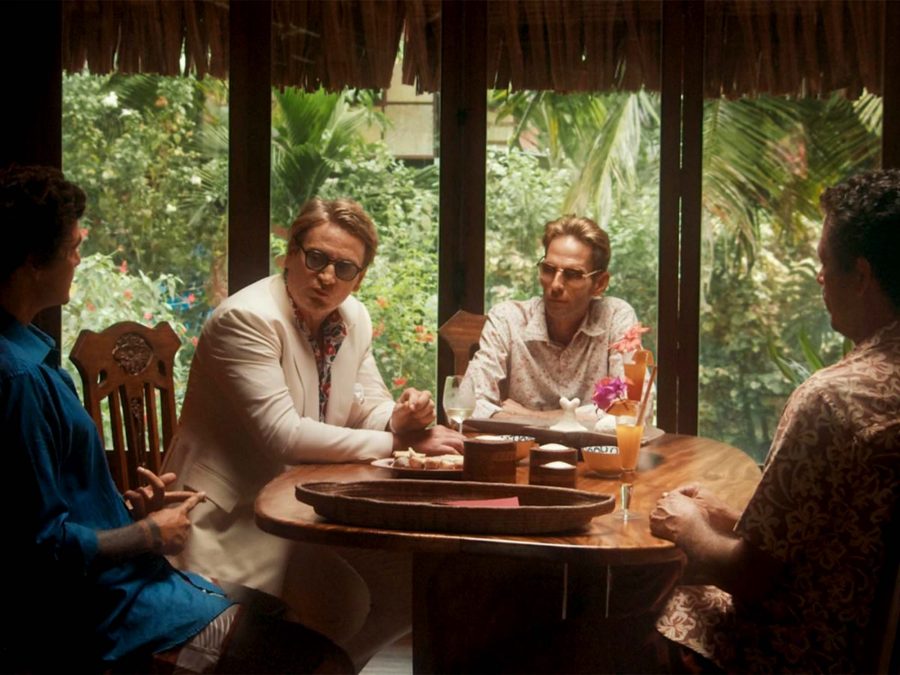A French diplomat with elusive motivations in even more elusive circumstances wanders the island of Tahiti in Pacifiction, the latest exercise in languorous, maximalist cinema from Spanish filmmaker Albert Serra. The film focuses on protagonist De Roller and his murky political engagements, and though narratively sparse, Serra leans into extreme aesthetics; the French Polynesian paradise is so saturated with colour (and colonialism) it appears to be rotting.
LWLies: Many of your previous films have focused on historical figures and characters such as Don Quixote or Louis XIV. Were you keen to try something new?
Serra: I was tired of it. At the beginning, I was drawn towards historical films because we all knew the main character and so I didn’t have to explain anything. I could focus on details and atmosphere and crazy things, instead of being obliged to lose time over obvious details about the characters. But with Pacifiction, I liked the idea of exploring colonisation and power and hierarchy – these tensions, this lack of harmony in the relationship between human beings. These are subjects that have been constantly there in all my films.
Pacifiction has quite an elliptical and abstract style that plays out over nearly 3 hours. How did you begin to craft this?
I don’t follow any kind of rules. The shooting doesn’t follow the script; the edit doesn’t follow the shoot. It’s the opposite. My system is based on destruction in order to avoid cliché. It’s one of my obsessions to go against your own ideas, especially whatever you thought was good in the previous phases of the script and in the original idea. For this film, I had more than 500 hours of rushes across three cameras, almost 200 hours of sound. During editing, I would choose what I liked in every scene, very strange things that are not connected: here I like the yellow colour of the light on the window; here I like this dialogue; here I like that you can see his tattoo.
Then I tried to build the scene with the editors using only these organic elements. It’s so difficult and so crazy that you never focus on the length or the meanings of the film because you just don’t know. You are editing the scene and you have so many struggles to make it organic with the elements you’ve chosen that you don’t care. What you arrive at by the end is quite spontaneous. When I finish a film, I don’t know what it means. What am I trying to say, I don’t know. I just create images.

How did you approach writing the character of De Roller?
With politicians, you never know how much of what they say and do is the idealism of really serving the people or the private interest of saving themselves. Because if the world were perfect, a politician would always mean what he says. Since the very beginning, I liked the idea of not knowing if he’s a liar or if he’s really attached to the local population. This idea was in the script, as was the idea that we will create the plot just by him moving from place to place and there will be the sensation of things happening in the background. What is fascinating is the way Benoît Magimel performs. It’s hyperrealistic. It’s more realistic than life.
He’s too believable!
I’ll tell you the trick. First of all, Magimel didn’t read the script. Obviously he had the script, but he was a little bit lazy. So in fact, he doesn’t know what’s going on in the film. We had the idea to give him an earpiece for his lines. So Benoit would be in these scenarios having not read the script, not knowing what he’s about to say, not knowing who he even is! He was very brave and very gifted. Each time, he would realise what’s happening in real time. We would give him difficult lines to further confuse him. You can’t control your body in that scenario – it’s impossible to give something concrete to the camera. The fluidity of what he does with his body, he will never be able to make this beautiful, planned gesture. It’s totally free. He did it in such a wild way.
In one scene between De Roller and the young, local leader, Magimel didn’t know that I’d already prepared with the other actor and we were going to abandon the earpiece for him. He was confident, he had done one take already and knew the dialogue. But I gave the earpiece to the other actor without him knowing. Suddenly, we do the second take and the other guy is saying very intelligent, aggressive things and Magimel feels he doesn’t know how to answer and is totally vulnerable. It worked so beautifully. He was so upset, he said, ‘Albert, I never allow anybody to talk to me like this, even inside fiction.’
The post Albert Serra: ‘What am I trying to say, I don’t know. I just create images’ appeared first on Little White Lies.
from Little White Lies https://ift.tt/ysYEkGP
via IFTTT

0 Comments